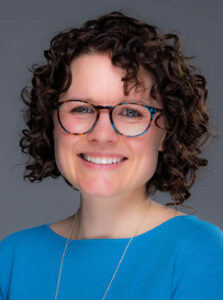
UMaine names 2022 Presidential Award winners
This year’s University of Maine Presidential Awards recognize outstanding achievement in teaching in Earth and climate sciences, research in the biophysics of flow-related biological and physiological functions in humans and animals, and impactful community engagement in nursing, particularly during the past two years of the pandemic.

Karl Kreutz, director and professor of the School of Earth and Climate Sciences, received the Presidential Outstanding Teaching Award; Xudong Zheng, associate professor of mechanical engineering, received the Presidential Research and Creative Achievement Award; and Kelley Strout, associate professor and director of the School of Nursing, and interim associate dean of health science in the College of Natural Sciences, Forestry, and Agriculture, received the Presidential Public Engagement Achievement Award.
“Karl is an innovative teacher and dedicated mentor who encourages experiential learning that make his courses memorable and empowering,” says UMaine President Joan Ferrini-Mundy. “Xudong, one of our National Science Foundation Early CAREER Award recipients, leads through his research in the mechanics of fluid dynamics that has multifaceted implications. Kelley’s community engagement has truly shaped the present and future of the School of Nursing, and touched the lives of countless Mainers.
“All three of this year’s Presidential Award recipients have such an impact on student success at UMaine, and their multifaceted contributions are integral to our R1 research university.”
Kreutz is a UMaine alumnus who joined the faculty in 2000 and was named director of the School of Earth and Climate Sciences in 2021. He teaches both graduate and undergraduate courses, including a first-year Research Learning Experience course focused on geoscience from the Maine coast to Mount Katahdin.
Kreutz is an internationally recognized researcher in the Climate Change Institute and was recently named University of the Arctic Chair in Arctic Ice, Climate and Environmental History. His research focuses on paleoclimate, glaciology and abrupt climate change. Current projects include high-resolution climate reconstructions in the Arctic, Antarctic and North Atlantic — global research that informs his teaching.
In the classroom, in the laboratory and in the field, Kreutz’s objective is to empower students to be lifelong learners, understanding and appreciating scientific habits — from systems thinking and scientific argumentation to open, interdisciplinary collaboration and experiential learning — that they can then put into practice and use beyond the classroom. Students recognize Kreutz’s depth of research experience that informs his teaching, and they appreciate his approach to instructor-facilitated, in-class problem-solving and peer dialogue. The methodology helps students, including those involved in research throughout the world, develop the problem-solving and critical thinking skills essential in making their own contributions to today’s profound climate and environmental challenges.
Throughout his 20-year teaching career, Kreutz has championed experiential learning and best practices into all levels of teaching, preK to graduate level. That level of dedication ranges from collaborating on a Boston Museum of Science immersive exhibition, “Arctic Adventure: Exploring with Technology,” and teaching an online class, ERS107: Energy, Environment and Climate, serving a wide range of students, including Early College students and those fulfilling GenEd requirements, to establishing a statewide partnership with high school Earth science programs to leading this semester’s new 400-level course, Sea-to-Sky Experience, that will take students to Southeast Alaska and the Canadian Yukon in May.

Zheng, who joined the UMaine community in 2012, conducts internationally recognized research in biofluid mechanics and computational fluid dynamics with the potential to inform a range of biological and medical applications. Zheng has developed and utilized advanced computer modeling techniques to improve understanding of the biophysics of various flow-related functions in humans and animals, including the mechanics of speech production.
His pioneering research in the past decade has led to the development of the first-of-its-kind high-fidelity multi-physics voice production model — computer modeling of phonation to better understand the mechanics of speech production. The biomechanical speech production simulations of flow-related phenomena to understand the underlying physics have long-term implications for the way physicians diagnose and treat speech disorders.
Zheng’s research also contributes to fundamental understanding of the relationship between vocal fold biomechanics and voice outcomes, informing voice disorder diagnosis and treatment. His long-term goal is to understand the mechanism that is responsible for the range, complexity and uniqueness of the human voice in order to provide personalized voice care.
Zheng’s biophysics research to improve human voice health and to develop innovative simulation-assisted voice care treatment technologies has received funding from the National Institutes of Health, National Science Foundation and the Novo Nordisk Foundation.
His computational modeling and analysis of flow structure-acoustics interactions can have multiple applications beyond voice production, such as the detection of heart murmurs generated by the flow-induced motion of heart valves, and the reduction of noise due to the blade-vortex interactions in wind turbines. He has developed innovative computer modeling techniques to study the flow structure-acoustics interaction in the biolocomotion of fish and flying insects that could lead to development of swimming and flying robots, and in collaboration with UMaine researcher Qian Xue, Zheng is investigating the hydrodynamic sensing mechanism associated with seal whisker geometry.

Community and statewide COVID-19 response, leadership in diversity, equity and inclusion, and addressing burnout and resilience in nursing are the hallmarks of Strout’s public engagement. Strout, an alumna and member of the UMaine School of Nursing faculty since 2015, leads a dedicated group of students, faculty and staff who have been among the frontline first responders during the pandemic, deployed on campus, in communities and statewide to help meet COVID-19 testing, vaccination and emergency hospital staffing shortage needs.
As director of the School of Nursing, she has closely collaborated with Maine’s hospital and health care partners to meet the new and ongoing challenges associated with the pandemic. In addition to the expertise and leadership she provided to UMaine and University of Maine System pandemic response teams, Strout has served on the Northern Light Community Mass Vaccination Committee, the Bangor Area Surge Staffing Planning Committee and the Maine School Health Advisory Committee. She also serves on the board of directors at Penobscot Community Health Center.
When the pandemic paused in-person classes for UMaine students, Strout worked with the faculty and school’s partners at Northern Light Eastern Maine Medical Center to get undergraduates their required clinical hours and allow 60 to graduate ahead of schedule to help address the shortage of nurses in COVID-19 health care settings in Maine and nationally. In addition, early training in intramuscular injections was provided for all students in the nursing program so they could be deployed to maximize community vaccination efforts, including initiatives in schools and rural areas.
Strout’s leadership also has led to the funding of two major initiatives by the federal Health Resources and Services Administration that will shape the future of nursing education and the profession in Maine and beyond. A more than $1.7 million HRSA grant to the School of Nursing, in partnership with Northern Light Health and Morgan State University will focus on increasing the diversity of Maine’s workforce in nursing. A $1.5 million HRSA award will fund WellNurse, a research and interprofessional program in partnership with Department of Psychology, School of Food and Agriculture, New Balance Recreation Center, and University of San Diego School of Medicine Center on Mindfulness to increase resilience and reduce burnout among School of Nursing students, faculty and staff. It ultimately will be a model for health professional programs throughout the University of Maine System and beyond.
Contact: Margaret Nagle, nagle@maine.edu
